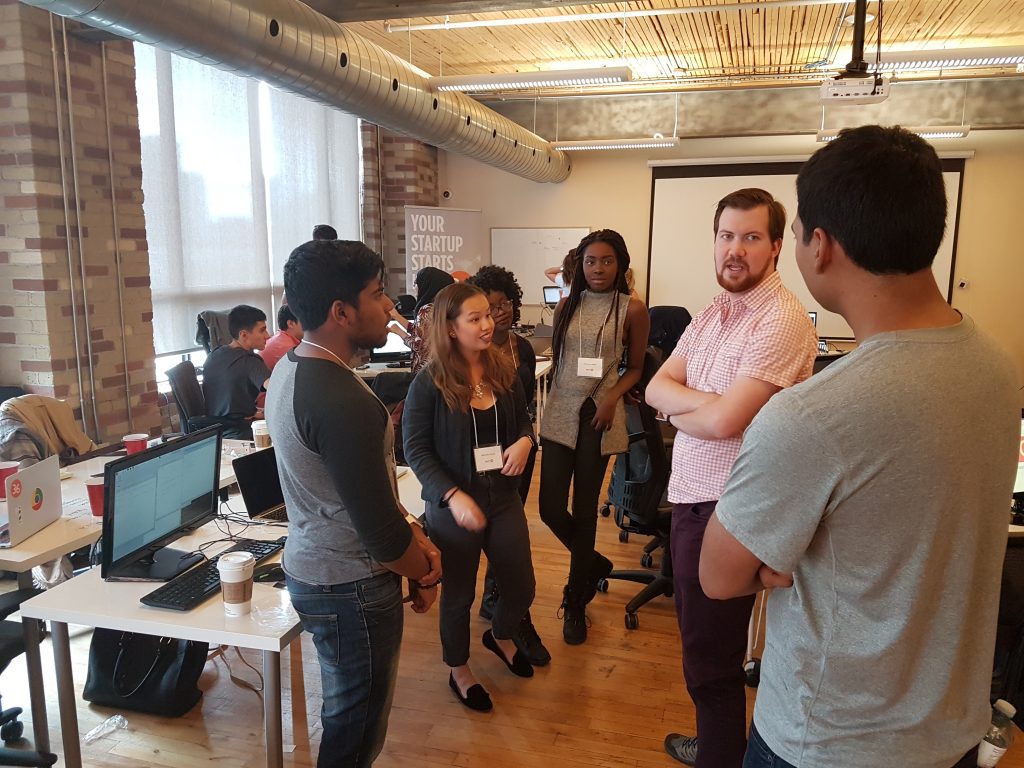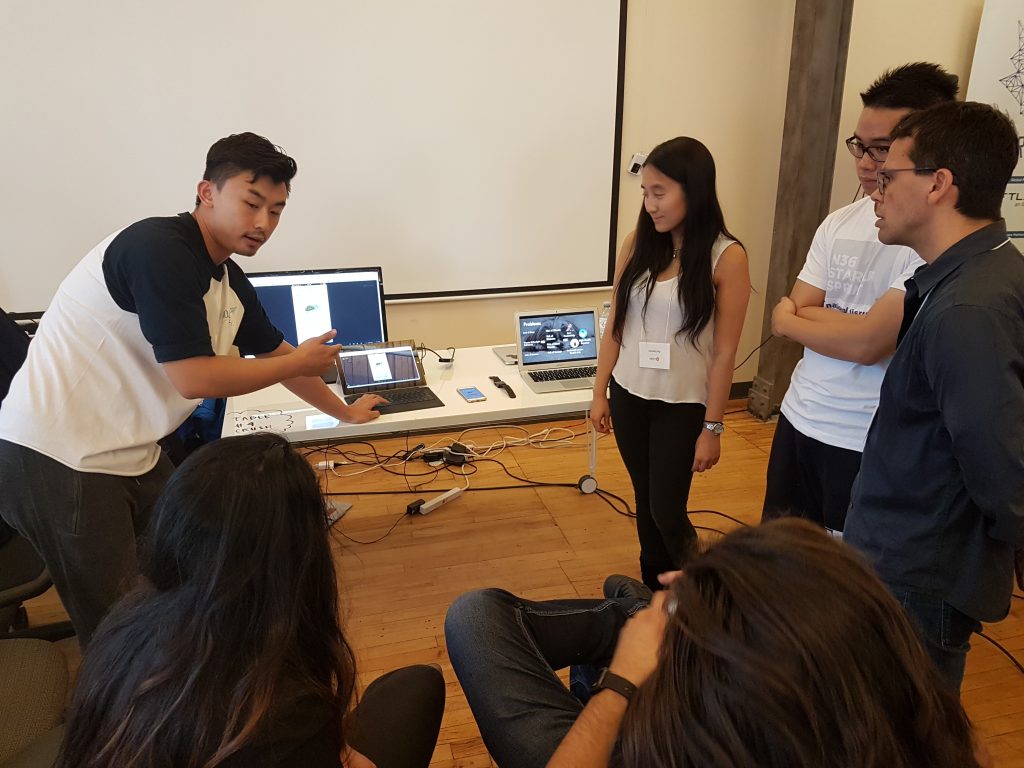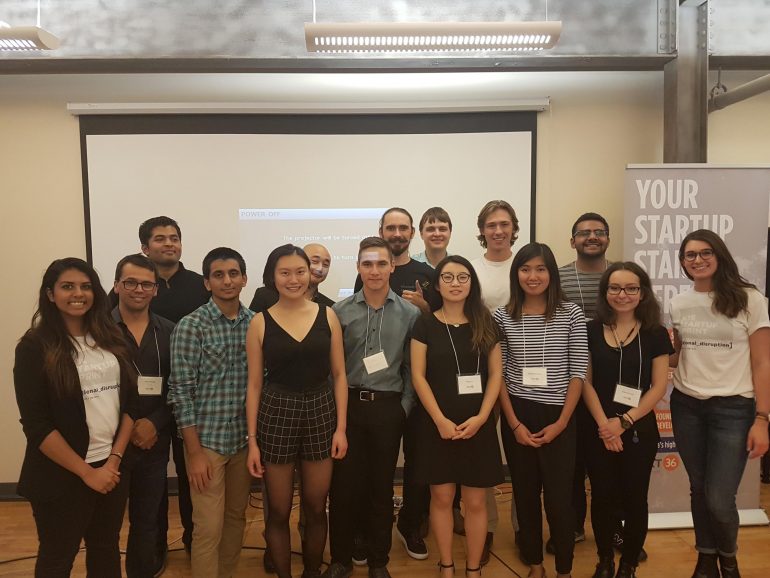Building a successful startup isn’t just about building the most innovative technology, it’s also about forming a disruptive idea that tackles a real problem, and has a lasting impact.
This was the theme at The Next 36 Startup Sprint: National Disruption weekend, where nearly 100 young minds gathered at Toronto-based coding academy Lighthouse Labs, to spend a weekend building, hacking, designing, and prototyping projects that tackle problems in sectors like healthcare and FinTech in Canada (disclosure: BetaKit’s Toronto office is located within Lighthouse Labs’ co-working space).
NEXT Canada, formerly known as the Next 36, is an organization dedicated to accelerating the growth of young entrepreneurs in Canada. The nonprofit is currently completing a national tour to recruit young entrepreneurs for its National Selection Weekend, where the entrepreneurs will pitch their ventures for the chance to be one of the 36 individuals in NEXT Canada’s seven-month program, and receive $50,000 in investments. According to Jon French, the director of marketing and communications at NEXT Canada, the Startup Sprint weekend was hosted in an effort to initiate new ideas, but also get people, especially university students and recent grads, interested in applying for the National Selection Weekend.
“We want the students here thinking big with what they build.”
– Jon French
“We’re trying to meet as many aspiring entrepreneurs as we can. The Next 36 Startup Sprint is meant for anybody who wants to build something,” said French. “The theme of national disruption is consistent with our overarching mission of building companies and organizations that have an impact. We want the students here thinking big with what they build and our hope is that not only will it introduce a lot of people to the Next 36 but some of them might have had such a good time that they carry on either their idea or the founding team into our program.”
The Next 36 Startup Sprint, which was held between Sept. 30 to Oct. 1, kicked off with presentations from sponsors of the event including members from Top Hat, the innovation consulting company Rhodium, SociaLIGHT Conference, and StartUp Here Toronto, as well as members of the NEXT Canada’s team, who offered participants advice about how to approach their ventures and ideas throughout the weekend.

On Friday evening, participants had the opportunity to informally pitch ideas to each other to help them form teams that consisted of developers, business experts, and researchers. While some people came to the event with the intention of coming up with a completely new business idea, others came with an idea in mind and sought team members to help take their idea to the next level.
Ingrid Grozavu, a participant at the Next 36 Startup Sprint, came to the event with the idea of developing a device to address errors and miscommunication that takes place between surgeons and their teams in operation rooms. She said that people with unique education and work experiences who were either interested in healthcare or knew how to develop a product asked to join her team, and this diversity is what led to the growth of her idea.
“Everybody comes from such a different background. I come from molecular genetics, someone on my team came from cell biology, someone else from industrial engineering and then business,” said Grozavu. “I thought it was interesting how we were able to merge all these fields and all these different skills into one single solution. I didn’t realize you could make such an interdisciplinary product.”
On day two of the startup sprint weekend, the newly formed teams divided up tasks and began working on different aspects of their ventures, such as prospective production costs, prototyping the product, and the pitch itself. The teams, which formed ventures addressing needs in healthcare, retail businesses, and city management, were able to seek advice from mentors from Rhodium and Next 36 alumni to improve their ideas; they also had access to hardware tools from Rhodium and WearHacks.
“It was full of amazing ideas, healthy discussion, and great personalities coming together.”
– Alexandra Lutchman
Alexandra Lutchman, a co-founder of Rhodium, said it was inspiring to see participants learn and grow from each other. “This weekend was very high energy. It was full of amazing ideas, healthy discussion, and great personalities coming together,” said Lutchman, who was also a judge during the final pitch competition. “They were talking, discussing, and creating an entire ecosystem within Lighthouse Labs.”
On day three of the startup sprint weekend, a panel of judges, which included Shaharris Beh, a co-founder of Hackernest; Kevin Kimsa, the CEO of AudienceView Ticketing; Michelle McBane, the investment director at MaRS IAF; and Satish Kanwar, the director of product at Shopify, walked around to 11 teams’ work stations to hear five minute pitches and assess their ventures based on factors like innovativeness, complexity, usability, design, and impact.

Of the 11 teams, five were selected to pitch one final time to the judges and other participants. Coming in third place and receiving $300 was Book the Street, a venture that developed a software platform that enables telecommunication, utility, and city service planners to book roads for their maintenance. The second place prize of $500 and the opportunity to work at Project: SPACES went to Reebot, a friendly retail chatbot designed to assist in making sales in the online marketplace. Lastly, the first place prize went to Grozavu’s company, SmartAssist, a healthtech venture that developed a monitor display system that uses a Myo band to enhance surgical team coordination during high-pressure procedural steps. In addition to receiving $1,000, SmartAssist will receive automatic entry to NEXT Canada’s National Selection Weekend, mentorship from Rhodium and SociaLIGHT’s co-founder Theresa Laurie, and have the chance to pitch their venture at Hackernest’s monthly meetup.
“I learned a lot and connected with some of the greatest young innovators from around the country.”
– Shabbar Manek
“I am really proud of what we accomplished over the weekend. I feel like I learned a lot and connected with some of the greatest young innovators from around the country,” said Shabbar Manek, one of the members of SmartAssist. “I have a fascination towards healthcare and felt as though it was an appropriate area to target given the theme of the weekend: national disruption.”
While not every team received a prize at the startup sprint weekend, NEXT Canada hopes that participants were able to gain a valuable experience and develop an idea that they can carry forward and continue to expand with their new teams. “I hope that out of this weekend, they actually see that they could turn this into a business,” said French. “They could commercialize and get excited about the resources that are available not just from the Next 36 but from other programs like ours and from the startup community. The goal is to see them actually continue with it.”
NEXT Canada also encourages participants and other aspiring entrepreneurs to apply to its 2017 cohort by October 18. The application can be found here.
Related: NEXT Canada commits to organizational changes following diversity and inclusivity criticisms


